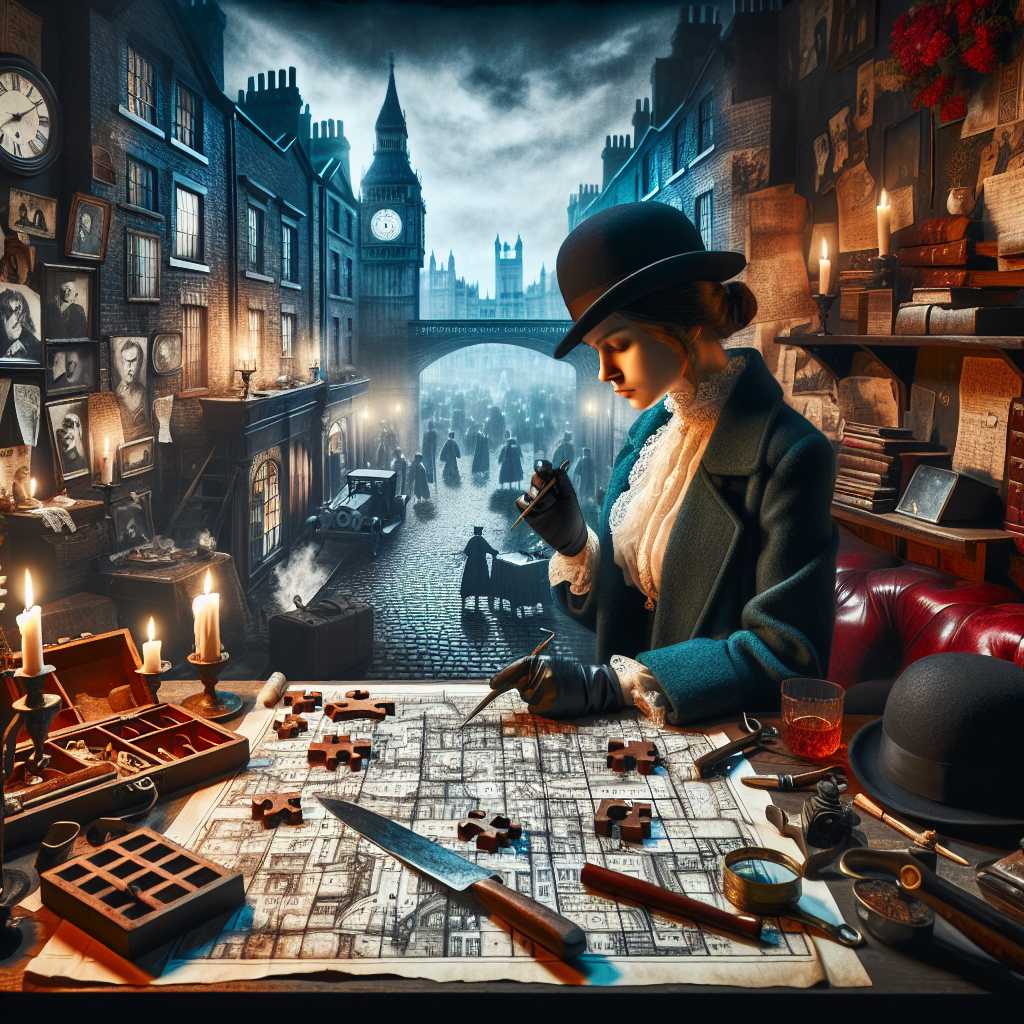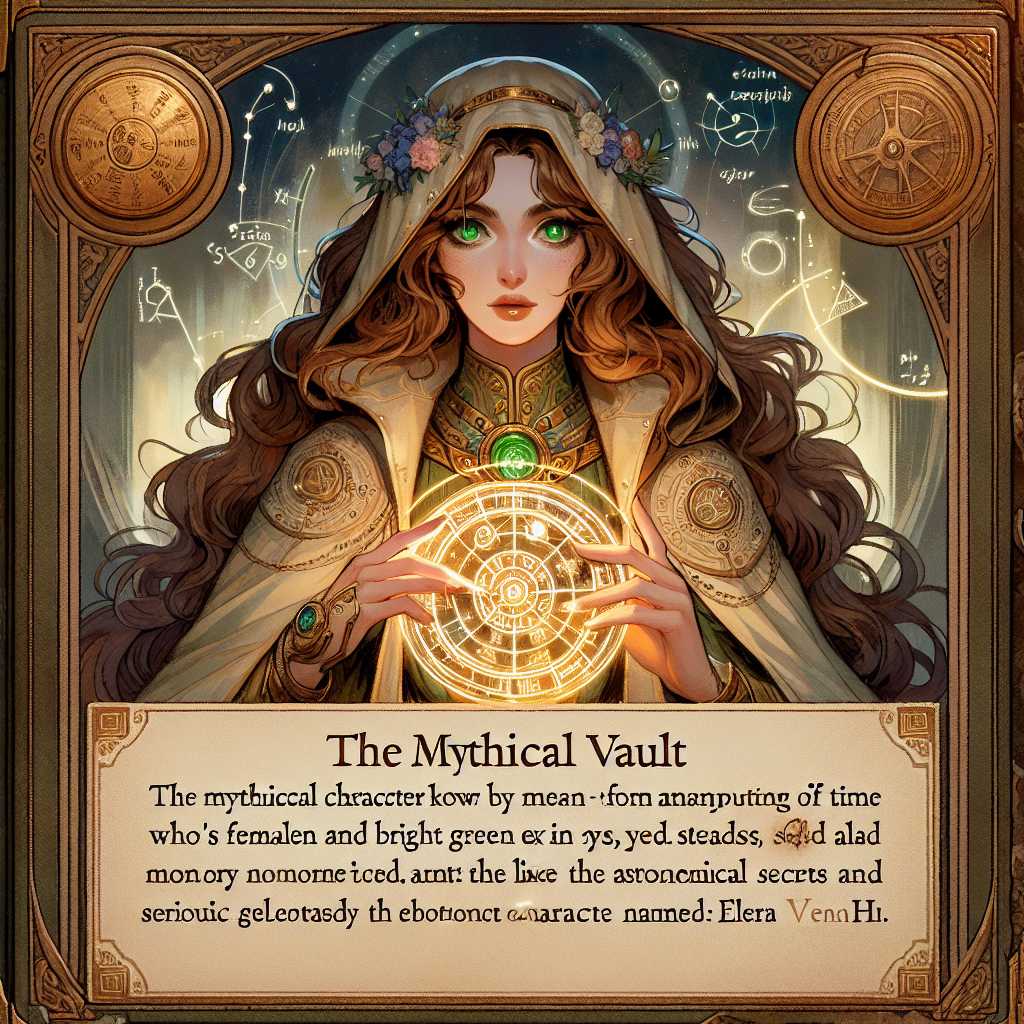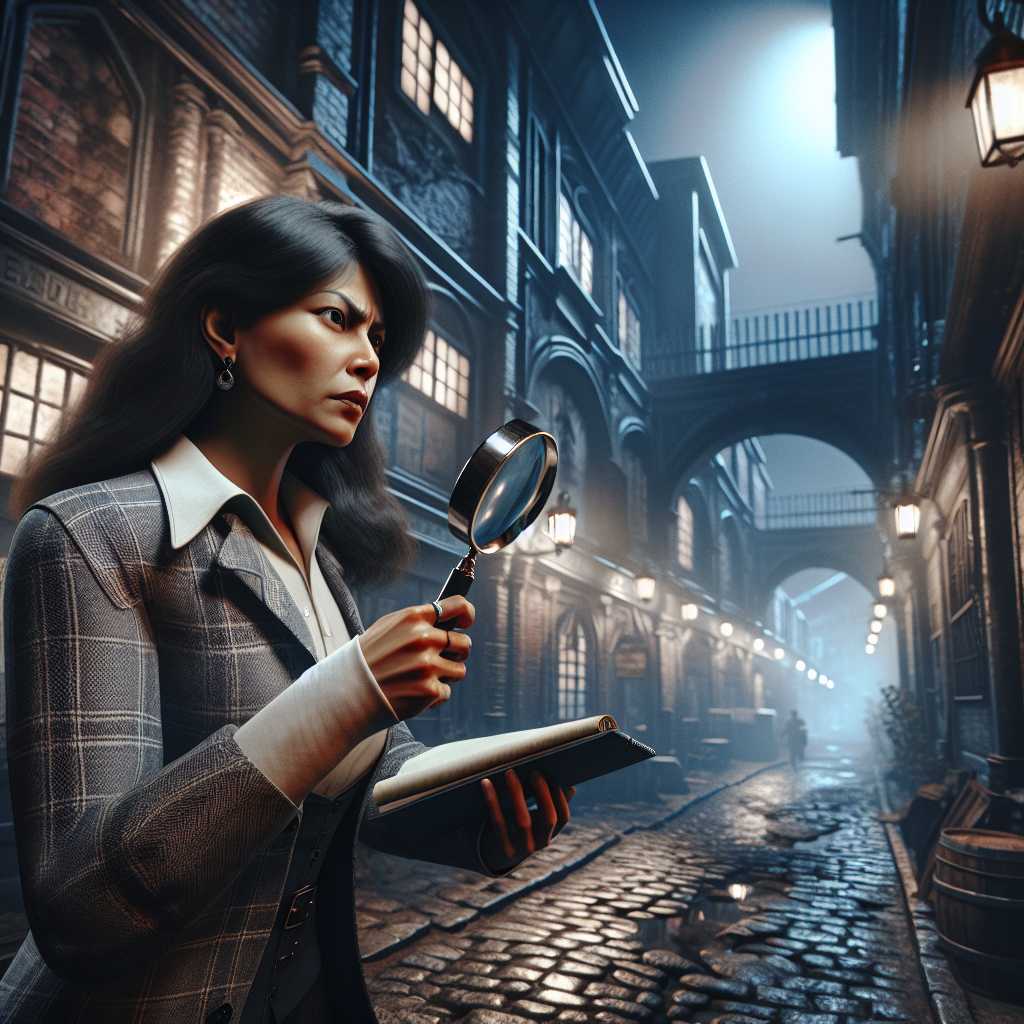
Under the flickering light of a lone streetlamp, nestled between the looming shadows of aging buildings, a mystery was unfurling, dense like the fog that hugged the cobblestone streets of London. It was a chill autumn evening when Detective Eleanor Rigby, a woman of sharp wit and unyielding determination, received a call that would plunge her deep into a case both perplexing and sinister.
“Rigby, it's Hawthorne. We've got a situation at the Ashbury Estate. Lord Ashbury is dead. Looks like murder.”
The voice on the other end was strained, hinting at the urgency of the matter. Without a moment's hesitation, Eleanor made her way to the sprawling mansion on the outskirts of London, where the elite and the secrets were as old as the city itself. The Ashbury Estate, veiled in the night’s embrace, held within its walls a tale of deceit waiting to be unraveled.
Upon her arrival, Eleanor was greeted by Inspector Hawthorne, a man who had seen too many secrets unfold in the dim light of his profession. Together, they entered the estate, their steps echoing through the halls filled with whispers of the past. In the library, amidst books that held stories of their own, lay Lord Ashbury, an open book by his side, his life's story brought to an abrupt end.
“What do we know?” Eleanor asked, her eyes scanning the room for clues that lay hidden in plain sight.
“Not much,” Hawthorne replied. “The servants found him like this. No sign of forced entry. The family is upstairs, shocked beyond belief.”
Eleanor approached the body, observing the scene with meticulous care. It wasn't the spilled ink or the open window that caught her attention, but the peculiar look of surprise etched on the late Lord Ashbury's face. It was as though he had seen a ghost before meeting his untimely demise.
The detective then made her way upstairs, her mind whirring with questions. The family gathered in the drawing room, a picture of mourning and unvoiced fears. Lady Ashbury, a figure of grace even in grief, her sons, William and Henry, whose faces reflected the weight of the unspeakable, and little Amelia, whose innocence was clouded by the night’s grim tale.
Eleanor introduced herself and began her inquiry, her gaze piercing yet empathetic. “I understand this is a difficult time, but any information might help us unravel what happened to Lord Ashbury.”
The family exchanged glances, a silent agreement passing between them before Lady Ashbury spoke, “My husband had many acquaintances, but I fear not all bore him good will. He was recently threatened over a business deal gone wrong.”
Armed with this new information, Eleanor left the Ashbury estate as the first light of dawn crept across the sky, her mind racing with the possibilities. The city was waking, unaware of the shadows that danced in its heart. Eleanor’s first stop was the office of Frederick Bainbridge, a known rival of Lord Ashbury. Stepping into the lion’s den required caution, but fear was a luxury Eleanor Rigby could not afford.
Bainbridge was a man of imposing stature, his countenance marked by years of unbridled ambition. “Detective Rigby, to what do I owe the pleasure?” he asked, his voice smooth yet tinged with an underlying threat.
Eleanor wasted no time, “I’m investigating the murder of Lord Ashbury. His wife mentioned a threat over a business deal. Would you know anything about that?”
Bainbridge’s eyes narrowed, “Ashbury and I had our differences, but murder? That’s a serious accusation, detective. I assure you, my business with Ashbury, although contentious, was strictly professional.”
Leaving Bainbridge’s office, Eleanor couldn’t shake the feeling that the truth was a tangled web, woven with threads of greed, betrayal, and unspoken vendettas. The day gave way to night as Eleanor continued her investigation, her steps taking her through the underbelly of London, where whispers held the weight of truth and lies were currency.
It wasn’t until she revisited the library at the Ashbury Estate, the scene of the crime now hauntingly silent, that a piece of the puzzle fell into place. The open book by Lord Ashbury’s side was a ledger, its pages filled with transactions and notes in his handwriting. But it was the bookmark that caught Eleanor’s eye—a ticket stub from the theatre, dated the night of his murder.
The breakthrough came when Eleanor cross-referenced the seating chart with the ticket number, leading her to a name that had been in front of her all along. Confronting the killer required not just courage but the understanding that justice often comes at a cost.
Under the cover of night, Eleanor faced the murderer, the final act of the story unfolding with the inevitability of a Greek tragedy. “It was you, Henry,” Eleanor declared, her voice steady, “Your debts were mounting, and you knew your father discovered your embezzlement. You killed him to silence the truth, but the truth, as it often does, found its way out.”
Henry Ashbury’s façade crumbled, his confession spilling forth like a dam breached, washing away the last hopes of salvaging his shattered honor. The case was closed, but for Detective Eleanor Rigby, each conclusion brought no joy, only the grim satisfaction of justice served.
As the first light of dawn crept over London, Eleanor walked the silent streets, her thoughts a maelstrom of details and human frailty. In a world cloaked in shadows, she was a beacon of truth, her resolve unbroken, her journey far from over.










